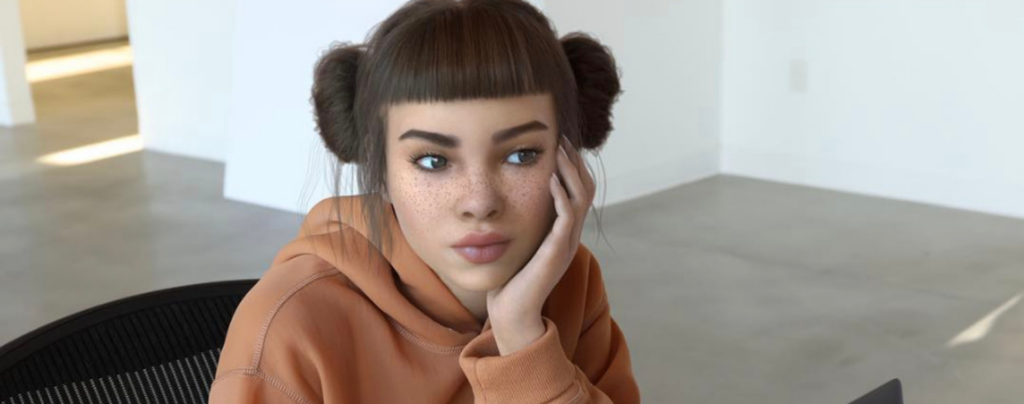We use cookies to improve your experience. By continuing to use this website you agree to our cookie policy.
As we venture into a new year, what critical areas in technology should Fashion be embracing? If the past two years have demonstrated anything, it is the significance of rapid adaptability in the face of anticipation.
In 2021, we were introduced to some unique and exciting forms of digital reality that have penetrated virtually every business sector as the art world discovered NFT’s as a way to boost artists’ control over their works and place a spotlight on unrecognised artists, all while tapping into the crypto world and keeping buyers engaged. Retail dipped its feet into the waters of virtual shopping, digital design and even virtual shows, such as catwalks and product launches. It’s safe to say that 2022 sees luxury brands taking their virtual presence to a whole new level with the news of the Metaverse approaching, digital influencers taking the lead and AR personalizing with better quality than ever before.
Digital influencing, PFPs and avatars
There’s a new era of influencers replenishing our social feeds, and the metaverse is taking the wheel on this one. Digital influencers are Internet-famous personalities that affect viewers’ buying decision-making, and their popularity is ever-increasing, forcing brands to cater to them.
If you haven’t already heard of her, then you’ve been living under a rock. An example of the new digital influencer age brings you Lil Miquela, an utterly virtual blogger sharing her digital lifestyle, products, and advertisements to her 3+ million followers, almost daily; this is a more significant exposure than most celebrities would ever provide a brand with.

We see brands jumping into the gaming world to get a head start when it comes to avatars. Tommy Hilfiger revealed a partnership with UGC designers from the Roblox community to create a thirty-piece digital fashion collection that players can use for their avatars. The Tommy x Roblox Creators collection is available via the online platform’s global marketplace. Looks draw influence from real-life signature designs from the brand and are merged with design twists developed by the UGC creators.
In addition, Forever21 worked with a metaverse agency to open a brand new virtual ‘Shop City’. Here, Roblox influencers manage and create their stores in competition with each other. As new merchandise lands in the physical world, the same pieces will become available virtually.
“Acting in considerate and truly inclusive ways will be key for anyone taking part in this digital world to ensure a genuinely purposeful human experience,” advises Tamara Hoogeweegen, strategist at the Future Laboratory, which also notes that branded virtual environments will become customisable with user-generated products, as seen with Forever 21, Tommy Hilfiger and Ralph Lauren’s Roblox world, which was influenced by user behaviour, mentions Vogue Business.
What this means is that in no time, we will be seeing avatars of our favorite influencers walking amongst us, in virtual worlds, influencing our everyday buying habits and tastes in a much more up-close-and-personal way, leaving the ‘traditional’ barriers of social networks behind.

AR Will Be Here To Stay For 2022
Augmented reality (AR) has been a vital component in the growth of the digital world, and Meta is raising a hefty investment into the new year for this one. According to sources, the long-term goal for the Meta group is that their smart-glasses, RayBan stories and Spectacles will evolve into must-have hardware and software.
“Beauty brands have been some of the earliest — and most successful — adopters of AR try-on,” says Meta VP of product Yulie Kwon Kim, who’s leading commerce efforts across the Facebook app. “As the buzz around the shift to the metaverse continues, we expect beauty and fashion brands to continue to be early innovators.”
Virtual Shopping Triumphs This New Year
A personalized experience hits the aim precisely as luxury retailers are no longer just seeing personal, VIP shopping experiences as an experiential marketing tool but rather the future of their online sales.
Dior Beauty went into partnership with luxury department store Harrods and Emperia to release their festive online virtual shopping experience, Atelier of Dreams. The shopping experience opened up a whole new stream of marketing, sales and brand opportunities as they presented the lavish beauty collection in a completely magical, spectacular and innovative way.

“With the consumer behaviour shifts seen over the past 18 months, the need to think about how the physical and digital worlds converge is ever increasing. While our bricks and mortar Harrods store will always be the core of our DNA, we are committing to creating inspiring and innovative ways of experiencing Harrods in virtual settings,” says Alex Unitt, Partnerships Director at Harrods. “We are delighted that our brand partners are working closely with us in delivering this ambition. The magical festive Dior Beauty pop-up is beautifully delivered in person but also on harrods.com via our immersive virtual experience. Users can discover exclusive content, explore products and click to purchase – it is very luxurious and wonderfully festive.”
The world of virtual shopping and personalised experiences won’t end just there, as technology and augmented reality become vital to the shopper experience, in and out of the store.
NFTs, collectables and crypto
2021 has elevated NFTs from a form of the avant-garde digital art form into a mainstream concept, providing both fashion and art with the opportunity to tap into new audiences, maintain control over the creation and grow their digital presence.
NFTs are the next step in cryptocurrency becoming a mainstream payment method, redefining the global economic model.
Retail has seen its younger audiences gravitating towards experimenting with these, “Consumers are more willing to try out unconventional brands, alternative ways to buy, and innovative systems of value like NFTs than they have been at any point in the past 20 years,” Forrester reports.
“Luxury is rooted in exclusivity. As luxury goods become more ubiquitous and easier to access, people are turning toward unique, non-reproducible experiences to fulfil a desire for the exclusive,” says Scott Clarke, VP of consumer products industry lead at digital consultancy Publicis Sapient. “For luxury brands to gain an advantage, it will be important to look beyond what has historically characterised these brands as ‘luxury’.”
So, which of those trends will survive 2022 and take over the art and fashion industries by storm?
